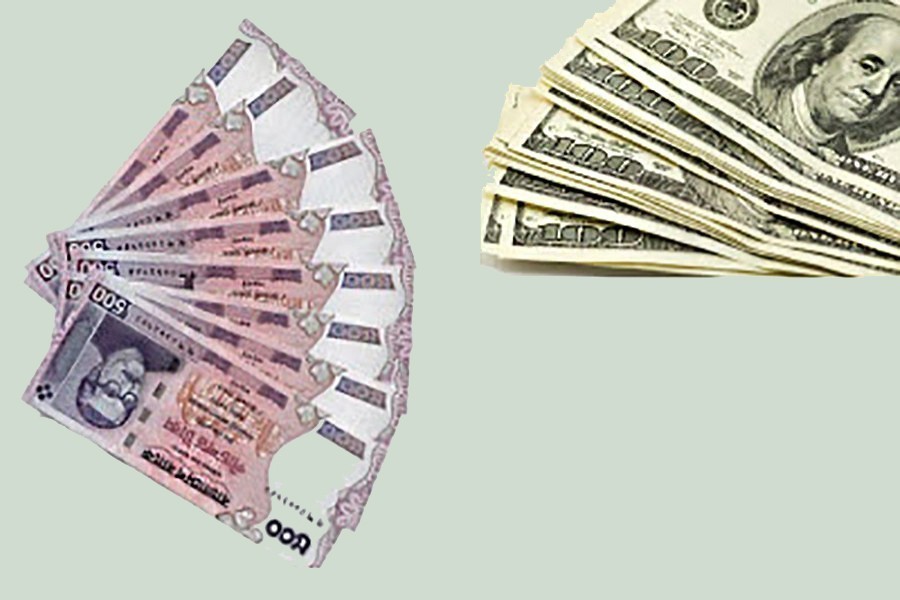
Published :
Updated :

The foreign ministry has warned that the exchange rate of Bangladesh, taka, may plunge further amid its devaluation against the US dollar with no sign of a quick end to the Ukraine-Russia war.
The US dollar touched its highest level since 2002 on Thursday while the devaluation of taka continued to hit Bangladesh’s trade heavily, sending costs of import, and production and shipment of exports through to the roof.
Bangladesh Bank has taken a series of measures in an effort to reverse the record slide in the value of the taka against the US dollar, but the moves appeared to be floundering.
In a recent report seen by bdnews24.com and submitted to a parliamentary standing committee, the foreign ministry said the trade deficit stood at $5.61 billion in the first half of the 2021-22 fiscal year, which was $6.87 billion in the same period last financial year.
Besides the deficit, pressure on the foreign currency exchange rate may further push taka’s value against dollar down, the ministry said in the report on the war’s impact on Bangladesh.
The parliamentary standing committee on the foreign ministry discussed the report on Wednesday. Its Chairman Muhammad Faruk Khan said they got the report.
“We’re aware of the issues. They’re basically economic issues, not diplomatic ones. People in the finance and commerce ministries are looking into the issues,” he said.
Serajul Islam, the spokesman for the central bank, recently said they have sold over $960 million on the open market so far this year to keep the flow normal.
The Bangladesh Bank also ordered the banks to keep the cash margin at a minimum 25 per cent to open the Letter of Credit for imports of goods that are not considered urgently needed. “It’ll discourage import of luxury goods and ease some pressure on the dollar.”
Besides these, the government has offered expatriate Bangladeshis to invest unlimited amounts of money in the dollar bond. But the government needs to pay the interests in dollars, so it has lowered the interest rate to reduce the amount of dollar going out of the country.
But analyst Selim Raihan thinks the authorities should assess the situation regularly and take immediate steps to keep it under control. “We will realise what to do if we do it after a fixed time.”
SANCTIONS, TRADE, FUEL AND FOOD
The foreign ministry fears the sanctions imposed by the West on Russian entities may complicate Bangladesh’s Rooppur Nuclear Power Plant Project and a plan to launch the country’s second satellite, both backed by Russia.
The report said the funds under the credit deal with Russia are transferred through the Federal Reserve of the US. Thus, the sanctions on Russia’s central bank may create complexities in the fund transfer, or even halt the transfer. The funds may never be recovered if they are halted, the ministry warned.
The sanctions may also delay the projects, for which Bangladesh has signed deals with Russia, the ministry said. These projects include the proposed Bangabandhu Satellite 2.
Bangladesh exports readymade garments worth $650 million to Russia annually. But with Russian banks cut off from the international transaction system SWIFT, payments by Russian businesses for garments ready for shipping may get halted, the report said.
As the war continues, shipping and insurance costs may rise, putting pressure on exports and imports, and finally widening the trade deficit further, the ministry warned.
It said fuel oil cost is feared to rise again if the war is prolonged. Thus, transport fares and agricultural production costs will increase.
And if the European countries seek more gas from other sources, such as Qatar, which are also the main source of liquefied natural gas or LNG for Bangladesh, prices will increase sharply, the foreign ministry said.
Europe and the US are currently focusing on the refugees from Ukraine. Therefore, the flow of funds for the Rohingya refugees from Myanmar may dry out, the report said.
It also emphasised seeking alternatives to Russia and Ukraine for wheat. Both countries are among top producers and exporters of grains.


 For all latest news, follow The Financial Express Google News channel.
For all latest news, follow The Financial Express Google News channel.